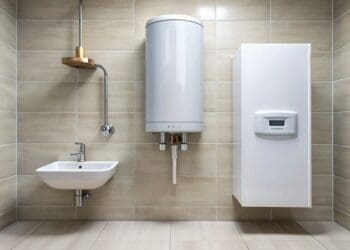In an age where digital transformation shapes every aspect of daily life, smart room technology stands at the forefront of elevating the hospitality and healthcare sectors to new heights. This sophisticated integration of digital devices and systems into hotel and hospital rooms not only promises enhanced operational efficiency but also significantly improves the guest and patient experience.
By granting individuals unprecedented control over their environment, smart room technology has redefined expectations for comfort and convenience, making it a cornerstone for innovation in service delivery.
This article delves into the myriad ways smart room technology enriches guest satisfaction, from the seamless hotel experience it offers to the improved patient engagement in smart hospitals. As we explore guest-centric smart room features, the operational advantages for hotels, and the broader impact on health systems, we provide a roadmap for understanding how this technology not only responds to but anticipates the needs of guests and patients.
Through a closer look at the tangible benefits of smart rooms, we illuminate how they serve as a nexus between technology and human-centric service, paving the way for a future where technology and hospitality intersect to create more personalized, empowering experiences.
Overview of Smart Room Technology

In the era of digital transformation, the hospitality industry has embraced smart room technology, redefining the guest experience with personalized, seamless, and high-tech solutions. The concept of a ‘smart room’ in a hotel is no longer a luxury but a standard, driven by the increasing demand from tech-savvy travelers.
Defining Smart Rooms
Smart rooms integrate various digital devices and systems, allowing guests to control and automate various aspects of their stay through voice commands, smartphone apps, or in-room touchscreens. These rooms are equipped with features like smart thermostats, voice assistants, smart lighting, smart TVs, smart locks, and wireless charging pads, among others. [5, 6, 7, 8, 10, 11, 16]
Technological Innovations in Hotels
- Smart Thermostats: Guests can control the room temperature using their smartphones or voice commands, ensuring a comfortable stay tailored to their preferences. For hoteliers, smart thermostats offer significant energy savings by automatically adjusting temperatures based on occupancy. [5, 6]
- Voice Assistants: Devices like Amazon’s Alexa or Google Home allow guests to control room features like lighting, temperature, and television with hands-free convenience. Voice assistants can also provide hotel information, enhancing the overall guest experience. [7, 2]
- Smart Lighting: Guests can personalize their room’s ambiance with smart lighting systems controlled through buttons or voice commands. These systems contribute to energy efficiency by automatically adjusting based on natural light levels or room occupancy.
- Smart TVs: Smart TVs offer more than just cable television, providing access to streaming services, social media, games, and other apps, allowing guests to enjoy their favorite content just as they would at home.
- Smart Locks: Advanced locking systems provide keyless entry to rooms, eliminating the need for traditional keys or cards. Hoteliers can monitor room access in real-time, instantly deactivate lost or stolen ‘keys,’ and enable remote check-in and check-out processes.
- Smart Mirrors: Interactive mirrors in hotel bathrooms can display news, weather, and support internet browsing, adding a touch of luxury to the guest experience.
- Smart Curtains/Blinds: Guests can control window coverings via smartphone apps or voice commands, adjusting natural light levels and enhancing comfort and privacy.
- Smart Mini-bars: Equipped with sensors, smart mini-bars can automatically charge guests for consumed items and notify staff for restocking, improving operational efficiency and accuracy.
- Smart Showers: Guests can pre-set their preferred water temperature, pressure, and shower duration, while some models offer features like steam control and integrated sound systems, providing a personalized bathing experience.
- Wireless Charging: Guests can conveniently charge their devices anywhere in the room without the need for cables or outlets.
- Smart Room Service: Smartphone apps or in-room tablets allow guests to browse menus, place orders, and track their progress in real-time, revolutionizing the way food and services are ordered.
- Smart Energy Management: These systems monitor and control energy usage in hotel rooms, adjusting lighting, temperature, and other energy-consuming features based on occupancy or pre-set schedules, contributing to the hotel’s sustainability goals.
Additionally, smart devices like noise sensors, smoke sensors, and motion detectors can help hoteliers monitor activity in rooms while maintaining privacy. In-room systems can control and automate various functions, while hoteliers can use a central dashboard to set schedules or automate on/off functions. Smart room technology also provides real-time access to energy consumption trends, allowing for optimization based on occupancy, seasonality, and guest preferences.
Guest-Centric Smart Room Features

Guest-centric smart room features are designed to enhance the overall guest experience by providing personalized control, convenience, and comfort. These features can be broadly categorized into three main areas:
Voice-Controlled Devices
Voice assistants like Amazon’s Alexa or Google Home are becoming increasingly popular in hotel rooms, allowing guests to control various aspects of their stay through simple voice commands. These devices can be used to adjust room settings such as lighting and temperature, operate entertainment systems, and even request hotel services like room service or housekeeping. Voice assistants act as digital concierges, providing guests with instant access to hotel information, local recommendations, and the ability to make requests without leaving their room.
Automated Room Controls
Smart room technology offers guests the ability to personalize their environment through automated controls. Smart thermostats enable guests to adjust the room temperature to their preferred levels using their smartphones or voice commands, ensuring a comfortable stay tailored to their preferences. Similarly, smart lighting systems allow guests to create the desired ambiance by adjusting brightness levels or changing the color of the lights with a touch of a button or through voice commands.
Smart curtains and blinds can be controlled remotely, enabling guests to adjust natural light levels and enhance privacy. Additionally, smart showers offer the convenience of pre-setting water temperature, pressure, and duration, providing a personalized bathing experience.
Smart Entertainment Systems
Smart TVs have become a standard feature in modern hotel rooms, offering guests a seamless entertainment experience. These TVs provide access to a wide range of streaming services, social media platforms, and apps, allowing guests to enjoy their favorite content just as they would at home. Some smart TVs even offer personalized content recommendations based on the guest’s viewing habits.
Hotel casting solutions, such as those utilizing Chromecast devices, enable guests to stream content from their personal devices directly to the in-room TV. By connecting to the hotel’s Wi-Fi network, guests can easily cast their favorite shows, movies, and music from popular streaming services like Netflix, Hulu, and Spotify onto the TV screen. This technology ensures a secure and private entertainment experience without the need to share personal subscriptions or login information with the hotel.
These guest-centric smart room features not only enhance the overall guest experience but also contribute to operational efficiency for hotels. By providing guests with personalized control and convenience, hotels can improve guest satisfaction and create a competitive advantage in the hospitality industry.
Enhancing the Guest Experience

Enhancing the guest experience is a top priority for hotels and resorts. By focusing on customization, personalization, security, and sustainability, hotels can create a more memorable and enjoyable stay for their guests.
Customization and Personalization
Hotels are increasingly using technology to tailor the guest experience. This includes allowing guests to customize their room settings, select preferred amenities, and receive personalized recommendations for dining and activities. Smart hotel rooms promise the personalization of everything from the temperature of a morning shower to when window shades open and close. Guests will soon be able to set these preferences remotely, so the rooms they check into after a long day are precisely to their liking.
Enhanced Security
Guests expect a safe and secure environment during their stay. Hotels are implementing advanced security measures, such as keyless entry, surveillance cameras, and secure Wi-Fi networks, to protect their guests and their belongings. Biometric authentication, such as facial recognition or fingerprints, is another type of technology that is helping to improve hotel security, ensuring access to secured areas only to authorized personnel and guests. Radar sensors can detect if a guest is experiencing life-threatening conditions in the room, which is especially important for those traveling alone.
Sustainability Features
Environmentally-conscious travelers are looking for hotels that prioritize sustainability. Hotels are incorporating eco-friendly practices, such as energy-efficient lighting, water conservation, and waste reduction, to appeal to this growing segment of the market. According to a Booking.com Survey, 80% of travelers find sustainable practices important. Hotels with smart room technology can reduce energy and water consumption, develop environmental awareness among guests and staff, and provide a personalized guest experience through climate control and lighting optimization.
Operational Advantages for Hotels

Hotels can reap significant operational advantages by implementing smart room technology, leading to increased efficiency, cost savings, and enhanced guest experiences.
Energy Savings
Smart building technologies enable hotels to optimize their energy usage, resulting in substantial cost savings. Automated systems, such as smart thermostats, occupancy sensors, and intelligent lighting controls, can adjust settings based on occupancy levels and guest preferences, reducing energy consumption. For instance, smart occupancy sensors can track which rooms and areas are being used in real-time, allowing hoteliers to maintain or adjust room temperature and lighting based on occupancy. This not only reduces energy consumption but also contributes to the hotel’s sustainability goals.
Streamlined Operations
Automated systems can help hotels streamline their operations, reducing labor costs and improving efficiency. Smart room technology can automate various processes, such as predictive maintenance of equipment, efficient resource management, and automated lighting and temperature controls. For example, smart systems can alert hotel employees when air filters, batteries, or other devices need to be replaced, minimizing equipment downtime and guest disruptions. Additionally, technologies like Robotic Process Automation (RPA) can automate repetitive tasks like booking management, billing, and housekeeping schedules, allowing staff to focus on enhancing the guest experience.
Data-Driven Insights
Data analytics and predictive modeling provide hotels with valuable insights into guest behavior, preferences, and resource consumption patterns, enabling informed decision-making and proactive management. Business Intelligence (BI) tools turn data into actionable insights, helping hoteliers optimize pricing strategies, enhance marketing efforts, and improve overall operational efficiency. By analyzing data related to resource allocation, inventory management, and staff scheduling, hotels can make informed decisions that minimize waste, reduce costs, and streamline operations.
Moreover, implementing big data solutions can help hotels navigate challenges such as data quality and integration, infrastructure and scalability, and the need for skilled data analysts. Proper data management and analysis can provide hotels with a competitive edge by enabling them to identify and address potential issues proactively, streamline service delivery, and ultimately enhance the guest experience.
Conclusion
Smart room technology heralds a new era in the hospitality and healthcare sectors, transforming guest and patient experiences by intertwining efficiency with personalization. Throughout this exploration, we highlighted the myriad benefits and operational advantages that such technology brings, underscoring its role in not only meeting but surpassing guest expectations for comfort and convenience.
By offering a comprehensive overview of how digital innovations like smart thermostats, voice assistants, and automated controls enhance the personalized guest experience, we have paved the way for understanding the profound impact of these technologies in creating spaces that cater to and anticipate the needs of modern travelers and patients.
The integration of smart room technology stands as a testament to the power of digital transformation in enriching human experiences through service delivery. As the hospitality and healthcare industries continue to evolve, the adoption of such technologies presents an invaluable opportunity to redefine what it means to meet guest and patient needs.
Moving forward, the ongoing embrace of smart room innovations will not only elevate guest satisfaction but also propel the sectors towards a future marked by an unwavering commitment to excellence in service, sustainability, and personalization. The journey we’ve embarked upon explores the fusion of technology and hospitality, heralding a promising horizon where guest satisfaction and operational efficiency align seamlessly.

















